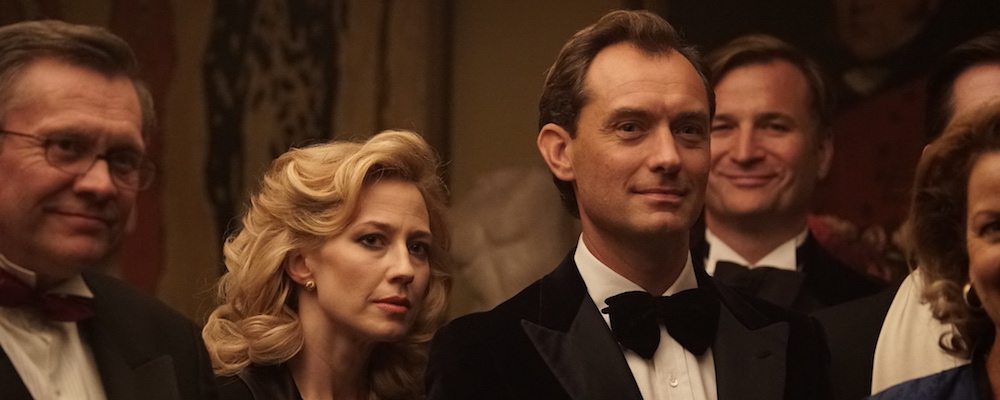‘The Nest’ Elegantly Finds the Madness in Living Beyond Your Means
Alci Rengifo
Has capitalism produced a more tragic figure than the dreamer living beyond their means? “The Nest” is an elegantly tragic portrait of delusion caused by desire. But the yearnings in this film have little to do with lust. They are fueled by an obsession to have it all quickly, even if you have to lie to yourself and everyone around you. The story is set at the dawn of the Reagan ‘80s, but it could happen anytime, anywhere. Voids abound in people that can only be filled by acquiring things, or so they like to believe. “The Nest” is releasing in select cities, please take into account any safety considerations before seeking it out.
It all seems so stable for commodities broker Rory (Jude Law) and riding teacher Allison (Carrie Coon), a married couple living plush in ‘80s suburban America. They have two kids, teenager Samantha (Oona Roche) and middle school-aged Benjamin (Charlie Shotwell). Then one day Rory informs Allison that they should move to his native England. There is a new opportunity at his old firm and would live even more comfortably. Allison seems to sense Rory isn’t being completely open about their finances, but she agrees. They make the big move and to Allison’s disbelief, Rory has somehow gotten them a good deal on a centuries-old manor. The kids start school, although Samantha is falling into moody teenage rebellion and Benjamin finds it hard to fit in with a rather bullish crowd. Allison’s beloved horse is transported over and she begins to ride again. But at the firm Rory doesn’t find the instant wealth he feels owed to him. Yet he keeps spending big, putting on airs and trying to convince Allison a major breakthrough is on the way, even as he asks to borrow money. Rory is so trapped in his blind ambitions he can’t see how the pressures of his deceptions begin to corrode the family.
It has been eight years since director Sean Durkin made his feature debut with the haunting “Martha Marcy May Marlene,” a sharp and original drama starring Elizabeth Olsen as a young woman dealing with the emotional aftershocks of having escaped a cult. His eye for precise compositions and building atmosphere are intact in “The Nest,” but now applied to a story where the main character is driven by a different sort of cult, the cult of materialist obsession. Cinematographer Mátyás Erdély, who brought such luminous eloquence to “Son of Saul” and “Sunset,” casts delicate shadows over the world of this movie. Whether suburbia or an English manor, colors are almost hidden behind dark corners. Visually it’s the perfect way to capture the moods of Rory and Allison. Their marriage is a different façade from typical, failing movie relationships. No one is having an affair. No one is stealing or carrying out illegal activities. The brilliance of Durkin’s screenplay is how it builds conflict through the study of Rory’s compulsive lying all because he wants to feel rich.
The choice of the ‘80s as the film’s time period is also perfect. Durkin doesn’t seem to care about nostalgia, but allegory. Rory’s increasingly demented greed, exasperated by his own inferiority complex for having grown up poor, is made even more intense by the neoliberal economics of the decade. He tells his old firm buddies upon returning that Margaret Thatcher and Ronald Reagan’s deregulation policies will help make everyone more ambitious. Even his boss, Arthur (played with sober and cold wisdom by Michael Culkin), warns him not to obsess over make a killing overnight. Even in the financial world it works best to just look at one percentage at a time. Jude Law’s performance, one of his recent best, is a pitch perfect profile of the misguided entrepreneur who sees chances to get rich quick everywhere, convinced of his own brilliance even when it yields nothing. At an excruciatingly embarrassing dinner he boasts about going to the theater or buying property in Portugal, only for a fed up Allison to reveal he’s never stepped inside a theater in his life.
Yet this is not a domestic drama per se. Durkin has made an atmospheric hybrid, a film that could almost be a psychological thriller about base human impulses. Allison’s prized horse grows ill, the house feels suffocating because she knows deep down they can’t afford it. It’s as if living an opulent lie is too much for her to bear. If Rory is a portrait of self-delusion, Allison is slowly aging and dying before our eyes. She and the children are trapped away from home, dragged to another country based on nothing but empty promises. A subtext is her shocking lack of agency. If she’s the one always having to lend Rory money, why must she endure this? Even Samantha confronts her about letting some man command her life. Can we blame the era? Not for all of it. Some people decide to stay, and only they know deep inside why. Maybe they don’t.
Durkin’s cinema harkens back to a classic form of personal drama common in the ‘70s, when rich psychological depths and refined film technique were enough to make a gripping drama. “The Nest” is about hiding truth from a spouse and ourselves and it is about a society obsessed with finding value in status. What was true in the ‘80s is truer today. Think of all your friends inventing false perceptions online, feigning lavish lifestyles on Instagram because they need to feel like somebody. Rory is a tragic figure, not so much a villain. The world is populated with countless people like this. A taxi driver asks him what he truly wants, and Rory can’t really answer. This is one of the year’s best films. Be careful what you wish for, you don’t always have to try so hard to make others believe it’s come true.
“The Nest” releases Sept. 18 in select cities.

